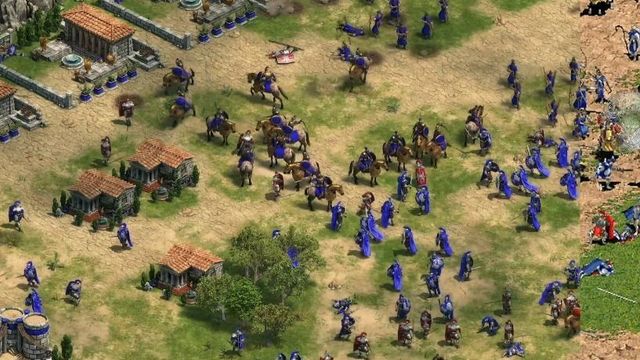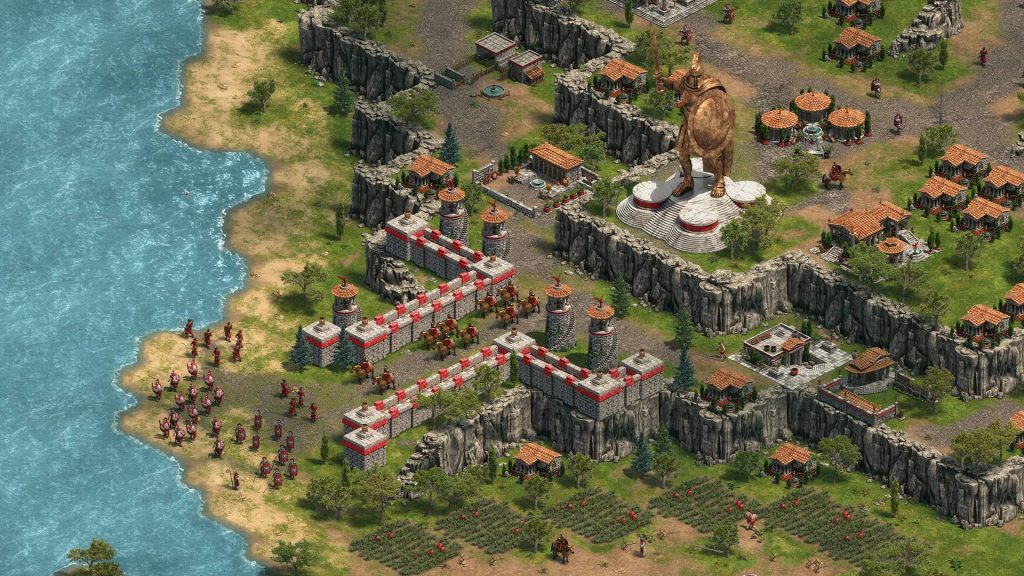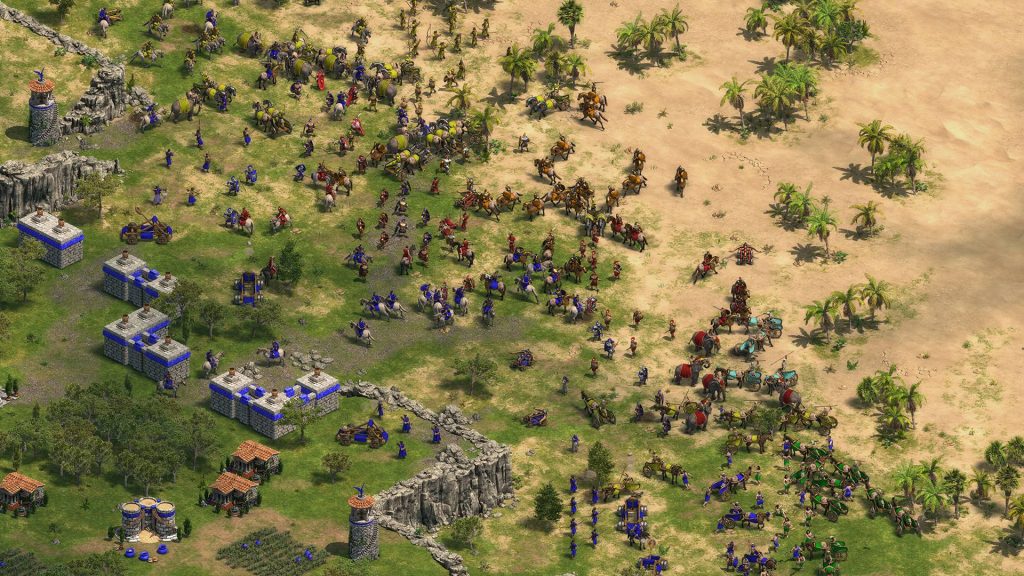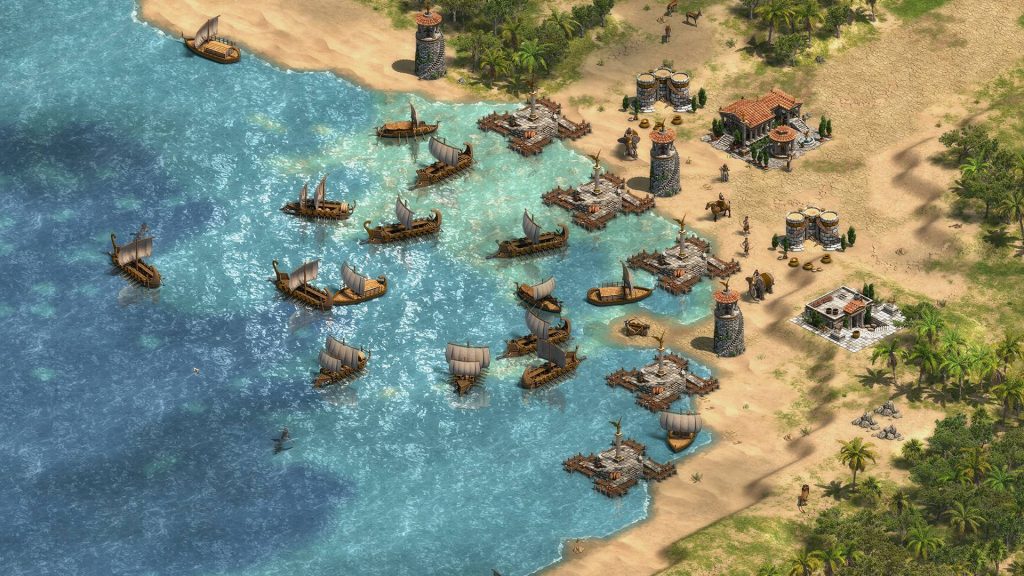
January 29th, 2009. That’s when Ensemble Studios closed its doors for the last time. Less than two months later, the studio’s final game, Halo Wars, would release. It would garner a positive critical reception and sell over two million copies. It was a fitting way for Ensemble to go out: one of Microsoft’s most successful first-party studios, working on Microsoft’s most successful IP. Since its founding in 1995, Ensemble had developed six games and six expansion packs, putting out a game nearly every year and sometimes more than one a year.
That Ensemble’s final game was a Halo title was fitting, but its closure was nothing short of shocking. Ensemble was one Microsoft’s best internal studios and one of the finest RTS developers of all time. Nearly everything they touched was a classic, from the original Age of Empires, to the sublime Age of Empires II, the epic Age of Mythology, and ultimately, Halo Wars, which did the impossible by making Halo work as an RTS, controlling well on a gamepad, and despite both of those things, offering depth and strategy as a multiplayer game. That Ensemble was shuttered before the game even hit shelves – allegedly for the studio’s propensity to go over budget, despite the fact that their games were always profitable – was inconceivable.
" Age of Empires: Definitive Edition succeeds, but it also reminds us why the original was overshadowed by its masterpiece of a sequel."
The RTS genre never recovered from Ensemble’s closure. With the exception of continued output by genre powerhouses Relic and Blizzard, the genre has largely gone dormant, replaced by MOBAs, hero shooters, and Real Time Tactics games – titles that value unit management and tactics over base building and strategy. When Ensemble went down, it looked all but certain that we would never see sequels to Age of Empires III, Age of Mythology, or Halo Wars. The golden age of the RTS was no more.
Then something strange happened: Microsoft started to resurrect Ensemble’s old franchises. Maybe they realized that closing the studio was a mistake. Maybe they understood that Ensemble’s properties were too good to sit on. Whatever the reason, the remasters and sequels came: Halo Wars 2, Age of Empires II: HD Edition and its new expansions, Age of Mythology: Extended Edition, Halo Wars: Definitive Edition, and on and on. Come hell or high water, Microsoft was bent on dragging Age of Empires, Age of Mythology, and Halo Wars into the future. But just sprucing up the past didn’t seem good enough for Microsoft. We also learned that an Age of Empires IV is coming, courtesy of Relic, but before that, the older games in the series would receive definitive editions that would update their visuals and push their gameplay into the modern era.
Age of Empires: Definitive Edition is the first step in that vision. Age of Empires itself is a strange title: it is neither loved as much as Age of Empires II nor disliked as much as III. Instead it simultaneously occupies a place of fanbase indifference and historical importance. Remakes and remasters are inherently tricky: you have to recreate the game in question, not as it existed, but as it’s remembered, nostalgia goggles and all. In that regard, Age of Empires: Definitive Edition succeeds, but it also reminds us why the original was overshadowed by its masterpiece of a sequel.
"The biggest change to Age of Empires is the visuals. The character models, art, and animation are all new and significantly upgraded, and you can fire up the 1997 version for fun in classic mode if you need convincing."
Forgotten Realms, the studio responsible for updating many of Ensemble’s older games, is at the reigns once again, and to their credit, they do an admirable job. The biggest change to Age of Empires is the visuals. The character models, art, and animation are all new and significantly upgraded, and you can fire up the 1997 version for fun in classic mode if you need convincing. The game is also cleaner and easier to navigate, as additions from later games, such as the idle villager button and the ability to queue up more than one unit at a time, have made the transition as well. The game doesn’t quite look new – the animations are a little stiff and the level of polish isn’t on par with a modern release – but it does look good, and the updates don’t sacrifice the game’s original style. They’ve also updated the original soundtrack and it sounds fantastic.
Things are largely the same on the gameplay front, too. You’ll build towns, advance through the ages, research new technologies, and forge armies, much like you did in the original release. The core gameplay loop remains as hypnotic as ever, and it’s easy to lose hours to a single scenario, but the lack of real gameplay changes come at a cost. The AI simply isn’t all that great, and unit pathing is a serious problem. You’re going to have to micromanage your units if you want to get anywhere. That’s fine, because that’s where most of the fun comes in. Yes, there’s diplomacy, trade, and research, but these systems lack both depth and complexity – you’re limited to one or two options at most.
The other issue is that the 19 empires on offer all share a small roster of the same buildings and many of the same units. In most cases, the differences are limited to certain unit and tech upgrades, and it’s hard to shake the feeling that you’re playing Egypt the same way that you’d play Rome, Greece, or Yamato. Worse, while the buildings look different depending on the empire you select, the units don’t. And it’s hard to believe you’re playing a Japanese or Egyptian empire when all of your characters look like they’re dressed up as Roman gladiators.
"Despite all of the content on offer, you probably won’t finish all of the campaigns. The empires are too similar and the sheer amount of maps and objectives can’t hide that. By the time you’ve reached the end of one campaign, you’ve seen them all."
Still, Age of Empires manages to do a lot with a little and both campaigns and scenarios are fun to play. The Definitive Edition comes with the Rise of Rome expansion, which gives you a whopping ten campaigns to play. Like most RTS titles, missions are varied. Some require you to gather resources and trade with your neighbors. Others task you with protecting a limited number of units as they navigate the map, assaulting a fortified position, or making the most of limited resources. Sometimes, hero units representing famous faces from mythology and history tag along, too.
The maps play a key role in how you play. On a coastal map, for instance, wood becomes a priority because you need it to build ships to fish, trade, attack your enemies, and transport your army. Because much of a coastal map is water, it also means wood is scarce, which means you’ll be forced into combat early and often for access to resources. Naturally, other maps pose their own challenges and will change how you build your empire and approach your enemy.
Despite all of the content on offer, you probably won’t finish all of the campaigns. The empires are too similar and the sheer amount of maps and objectives can’t hide that. By the time you’ve reached the end of one campaign, you’ve seen them all. But the missions hold up, provided they can keep your interest. Even if they can, you’ll have to deal with the terrible pathing and general lack of advanced tactics. After all, this is a game from 1997. Your best bet is to build up and a big army and steamroll everything. Combat just isn’t complex enough for anything else. This isn’t StarCraft.
" This is, without question, the definitive version of Age of Empires, but the original game isn’t the one people remember. Age of Empires II is."
If you do get bored of the campaigns, there’s variety to be found in custom games and the eight player online battles. Both are great, and alleviate many of the game’s AI problems, but the former works better than the latter. Getting into games can be a bit of an issue, and you’ll often see players getting disconnected before the game even starts. This was a problem in the beta, too, and while it’s better now, it’s still an issue that needs to be fixed.
Like most of the great empires of human history, Age of Empires’ biggest problem is time. Many of these issues were here 20 years ago; we just didn’t notice them, or they were par for the course. They aren’t now. In many ways, Age of Empires was a victim of its own success. The games that came after it followed the trail it blazed and simply did what it did better. This is, without question, the definitive version of Age of Empires, but the original game isn’t the one people remember. Age of Empires II is. This game doesn’t even let you build gates, just walls. Who wants to live in an empire that can’t even build a gate?
Since the definitive edition of Age of Empires II is coming, it’s likely that Age of Empires: Definitive Edition will soon be consigned to the dustbin of history, just as its predecessor was. But that doesn’t mean that what’s here is without value. This is still a good game, whether you’re on your first trip through history or just here for the nostalgia. But as we know, all empires fall, and the legacies they leave behind are less important that what emerges from the ashes afterwards. That’s where the real excitement is.
This game was reviewed on the PC.
Updated graphics and soundtrack. Captures the style of the original well. Lots of campaigns to play. Fun solo and online.
Poor pathing and AI. All of the empires have the same units and buildings. Combat and diplomacy are limited. You can't build gates. Online can be finicky.




















